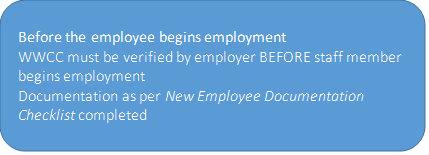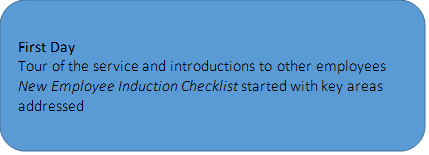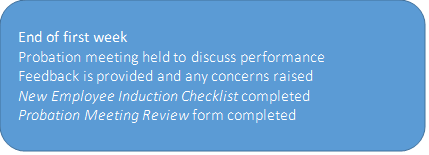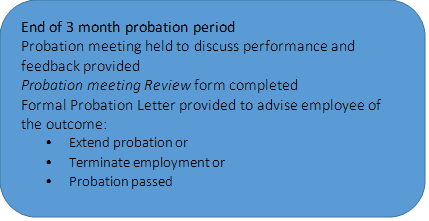Probation Induction and Orientation Policy
POLICY CONTENT
Our School aims to implement a probation and induction orientation program to ensure employees are aware of their roles and responsibilities to enable effective performance within their employment at The Akidamy School of Early Learning. A formal induction and orientation program provides an opportunity for new employees to have an understanding of the values and organisational culture within our School.NATIONAL QUALITY STANDARD (NQS)
| QUALITY AREA 4: Staffing Arrangements |
|---|
| 4.1 | Staffing arrangements | Staffing arrangements enhance children’s learning and development. |
| 4.1.1 | Organisation of educators | The organisation of educators across the service supports children's learning and development. |
| 4.1.2 | Continuity of staff | Every effort is made for children to experience continuity of educators at the service. |
| 4.2 | Professionalism | Management, educators and staff are collaborative, respectful and ethical. |
| 4.2.1 | Professional collaboration | Management, educators and staff work with mutual respect and collaboratively, and challenge and learn from each other, recognising each other’s strengths and skills. |
| 4.2.2 | Professional Standards | Professional standards guide practice, interactions and relationships. |
| QUALITY AREA 5: Relationships with Children |
|---|
| 5.1.1 | Positive educator to child interactions | Responsive and meaningful interactions build trusting relationships which engage and support each child to feel secure, confident and included. |
| QUALITY AREA 7: Governance and Leadership |
|---|
| 7.1.3 | Roles and Responsibilities | Roles and responsibilities are clearly defined and understood and support effective decision making and operation of the School. |
| 7.2.3 | Development of professionals | Educators and staff members’ performance is regularly evaluated, and individual plans are in place to support learning and development. |
RELATED LEGISLATION
| NSW Anti-Discrimination Act 1977 | Fair Work Act 2009 |
|---|---|
| Federal and State Occupational Safety and Health Legislation | Federal and State Equal Opportunity Legislation and any other relevant industrial awards |
| Education and Care Services National Law Act 2010 | Children and Young Persons Act 1998 |
| Sex Discrimination Act |
PURPOSE
We aim to ensure the most suitably qualified, experienced and reliable staff are employed at our School. We are committed to ensuring we meet all legislative and regulatory requirements including the Education and Care Services National Law and National Regulations, Children and Young Persons Act, Fair Work Act and Anti-Discrimination Act. The National Quality Framework states that a comprehensive induction process plays a critical role in creating and maintaining a positive and professional culture. By providing an efficient and effective induction and orientation program we aim to ensure employees have the skills and knowledge to perform their roles confidently.An effective induction and orientation program provides a formal process to provide new employees with information regarding service policies, procedures and practices. An induction and orientation program is available for all new employees and employees returning to work after a period of absence to ensure a smooth integration into our Service.
SCOPE
This policy applies to staff, educators, Approved Provider and management of the School.CHILD SAFE STANDARDS
Our School is committed to be a child safe Education and Care Service and aims to implement the 10 Child Safe Standards as recommended by the National Office for Child Safety. Our robust recruitment, probation and induction/orientation processes play a vital role in protecting children from harm.PROBATIONARY PERIOD
All new employees are subject to a probationary period of six months. This ensures assessment for both the employee and service to ensure suitability of the role for the employee.The probationary period is a condition of employment for all new employees. During this time employees will receive advice, training and guidance to help them become familiar with and competent in, performing the work they have been appointed to do. The appointment is subject to the satisfactory completion of the probationary period which itself is subject to termination during any stage, by either party, upon notice in writing, or by payment in lieu of notice.
During the probationary period an induction and orientation program will be initiated with the new employee. This allows the new employee an opportunity to understand the expectations and standard of conduct required to pass the probationary period.
Probationary meetings will be scheduled within the first week of employment and at the end of the probationary period, feedback will be provided to the employee regarding performance. The probation meeting is also an opportunity for the new employee to ask any questions or raise any concerns. A Probationary Meeting checklist and record will be completed to document the meeting and placed into the staff file. (See Probation Meeting Review)
The probationary period may be extended at the end of six (6) months for an additional three (3) months if any conduct or performance concerns are identified. If concerns are raised during the probationary period, they will be addressed during the probationary meeting and documented. If a decision to end the employee’s employment within the employment period is made, the employee will receive the appropriate notice as per employment contract and receive the termination of employment in writing.
The employee may terminate employment within the probationary period by providing the appropriate notice in writing as per employment contract. The employer may terminate employment within the probationary period by providing the appropriate notice as per employment contract. A termination of employment letter will state the reason of termination, notice period and the date of the employees last day of employment.
At the end of the probationary period, the Approved Provider or appointed nominee will advise if the employee has successfully completed the probationary period and provide a letter confirming their ongoing employment.
Employees, full time and part time, will accrue and are eligible to access paid leave entitlements during the probationary period such as annual leave and sick leave. If an employee does not pass their probation period any unused annual leave entitlements will be paid out.
INDUCTION AND ORIENTATION
Our School is committed to providing a comprehensive induction program to ensure the smooth integration of new employees. The Approved Provider or assigned nominee will support the new employee and help them to understand the organisational structure, how decisions are made and communicated and what role they will have in the decision-making process.An induction checklist will be used to support this process, which explains an employee’s responsibility to know the policies, procedures and practices within our Service and their duty of care obligations to ensure the safety and wellbeing of all children.
Induction will include relevant information on child safe practices adhering to the Child Safe Standards, Code of Conduct, Child Information Sharing Schemes (CISS) and strategies that identify, assess and minimise risks to children and mandatory reporting procedures including Reportable Conduct Scheme.
On the first day of employment the Approved Provider or assigned nominee will ensure the new employee has completed all relevant paperwork as per New Employee Documentation checklist.
The New Educator Orientation resources are available to ensure all areas of the School are covered in the first week.
The induction and orientation program will work alongside the probation period. It is expected the induction and orientation program will be performed during the six (6) month probation period.
The new employee will be required to read key School policies and procedures as part of the induction and orientation program. These include, but are not limited to, the following key policies:
- Child Protection Policy
- Child Safe Environment Policy
- Sick Staff Policy and Procedure
- Code of Conduct Policy
- Behaviour Guidance Policy
- Educational Program Policy
- Work Health and Safety Policy
- Privacy and Confidentiality Policy
- Emergency Evacuation Policy
- Medical Conditions Policy
- Incident, Injury, Trauma and Illness Policy
- Dealing with Complaints Policy
During the induction and orientation program, new employees will be advised of any children with a health care need, allergy or relevant medical condition. The Service Philosophy, Staff Handbook, Code of Conduct and the Early Childhood Code of Ethics will be shared with the new employee during the induction and orientation program.
All new employees will be appropriately trained and informed of workplace health and safety policies and procedures before commencing employment, such as hazard and incident forms and reporting procedures, use of PPE equipment, location of fire safety equipment, emergency and evacuations procedures (including lockdowns), location and use of Safety Data Sheets (SDS), any WorkCover information, security procedures and location of first aid kits as described in the New Employee Induction Checklist.
As part of the induction and orientation program, the Approved Provider or assigned nominee will provide opportunities for discussing and unpacking the following key documents:
- Education and Care Services National Law and National Regulations
- The National Quality Standard
- Belonging, Being and Becoming: The Early Years Learning Framework
- My Time Our Place: Framework for School Age Care in Australia (as required)
- Early Childhood Australia- Code of Ethics
- National Principles Child Safe Organisations -Child Safe Standards
- Reportable Conduct Schemes
- Child Information Sharing Scheme (CISS) and Family Violence Information Sharing Schemes (FVISS)
PROBATION, INDUCTION AND ORIENTATION OVERVIEW








SOURCE
Australian Government. Fair Work Ombudsman. (2020). Hiring employees fairwork.gov.au/find-help-for/small-business/...Australian Human Rights Commission. Child Safe Organisations. humanrights.gov.au/our-work/childrens-rights/pro...
Early Childhood Australia Code of Ethics. (2016).
Education and Care Services National Law Act 2010. (Amended 2018).
Education and Care Services National Regulations. (2011).
Guide to the Education and Care Services National Law and the Education and Care Services National Regulations. (2017).
NSW Government. (2020). Office of the Children’s Guardian: A guide to the Child Safe Standards kidsguardian.nsw.gov.au/ArticleDocuments/838/ChildSaf...
Victoria Government. Business Victoria. (2020). Staff recruitment business.vic.gov.au/hiring-and-managing-staff/sta...
Victoria Government. Business Victoria. (2020). Staff induction program and probation review
business.vic.gov.au/hiring-and-managing-staff/sta...
Did this answer your question?
If you still have a question, we’re here to help. Contact us
